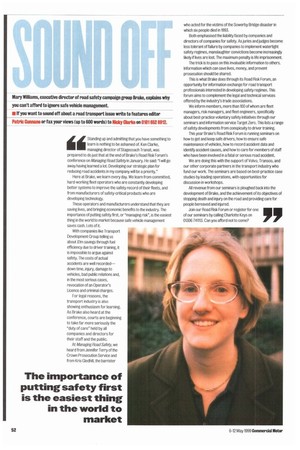Mary Williams, executive director of road safety campaign group Brake, explains why you can't afford to ignore safe vehicle management.
Page 54

If you've noticed an error in this article please click here to report it so we can fix it.
• If you want to sound off about a road transport issue mite to features editor Patric Minus or fax your views (up to 600 words) to War (larks on 0181 652 8912.
i Standing up and admitting that you have something to
learn is nothing to be ashamed of. Ken Clarke, managing director of Stagecoach Transit, was prepared to do just that at the end of Brake's Road Risk Forum's conference on Managing Road Safetyin January. Ho said: "I will go away having learned a lot. Developing our strategic plan for reducing road accidents in my company will be a priority."
Here at Brake, we learn every day. We learn from committed, hard-working fleet operators who are constantly developing better systems to improve the safety record of their fleets, and from manufacturers of safety-critical products who are developing technology.
These operators and manufacturers understand that they are saving lives, and bringing economic benefits to the industry. The importance of putting safety first, or "managing nsk", is the easiest thing in the world to market because safe vehicle management saves cash. Lots of it.
With companies like Transport Development Group telling us about Lim savings through fuel efficiency due to driver training, it is impossible to argue against safety. The casts of actual accidents are well recorded down time, injury, damage to vehicles, bad public relations and, in the most serious cases, revocation of an Operator's Licence and criminal charges.
For legal reasons, the transport industry is also showing enthusiasm for learning. As Brake also heard at the conference, courts are beginning to take far more seriously the "duty of care" held by all companies and directors for their staff and the public.
Al Managing Road Safety, we heard from Jennifer Terry of the Crown Prosecution Service and from Kris Gledhill, the barrister who acted for the victims of the Sowerby Bridge disaster in which six people died in 1993.
Both emphasised the liability faced by companies and directors of companies for safety. As juries and judges become less tolerant of failure by companies to implement watertight safety regimes, manslaughter convictions become increasingly likely if lives are lost. The maximum penalty is iife imprisonment.
The trick is to pass on this invaluable information to others. Information which can save lives, money, and prevent prosecution should be shared.
This is what Brake does through its Road Risk Forum, an opportunity for information exchange for road transport professionals interested in developing safety regimes. This forum aims to complement the legal and technical services offered by the industry's trade associations.
We inform members, more than 100 of whom are fleet managers, risk managers, and fleet engineers, specifically about best-practice voluntary safety initiatives through our seminars and information service Target Zero. This lists a range of safety developments from conspiculty to driver training.
This year Brake's Road Risk Forum is running seminars on how to get and keep safe drivers, how to ensure safe maintenance of vehicles, how to record accident data and identify accident causes, and how to care for members of staff who have been involved in a fatal or serious road accident.
We are doing this with the support of Volvo, Transco, and our other corporate partners in the transport industry who fund our work. The seminars are based on best-practice case studies by leading operations, with opportunities for discussion in workshops.
All revenue from our seminars is ploughed back into the development of Brake, and the achievement of its objectives of stopping death and injury on the road and providing care for people bereaved and injured.
Join our Road Risk Forum or register for one of our seminars by calling Charlotte Keys on 01306 741113. Can you afford not to comeP












































































































